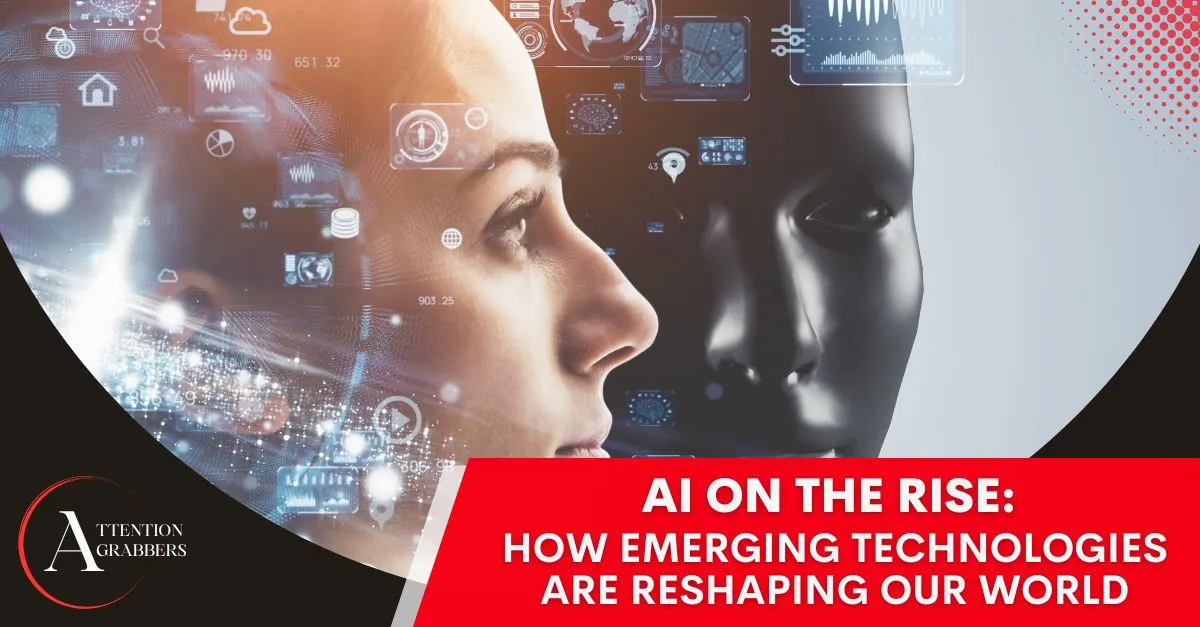
AI on the Rise: How Emerging Technologies are Reshaping Our World
Category
BENEFITS OF READING THIS BLOG
- Gain insights into the latest advancements in Artificial Intelligence (AI).
- Understand how AI is transforming various industries and aspects of our daily lives.
- Explore the potential benefits and challenges of AI adoption.
- Stay informed about the implications of AI on the future of work and society.
- Discover exciting opportunities and possibilities offered by emerging AI technologies.
Introduction:
Artificial Intelligence (AI) has emerged as a game-changer in the modern world, revolutionizing various industries and aspects of our daily lives. AI’s influence is profound and rapidly expanding from healthcare to finance, transportation to entertainment. In this blog, we will explore the benefits of diving into the world of AI and understanding how emerging technologies are reshaping the landscape of the United States.
The Evolution of AI:
The journey of AI dates back to the mid-20th century, but recent advancements have propelled it to new heights. Starting as a concept of building machines that can simulate human intelligence, AI has come a long way. Today’s AI systems, powered by deep learning algorithms and neural networks, can perform complex tasks with remarkable precision and efficiency.
AI Applications Across Industries:
In the healthcare sector, AI is transforming diagnostics with its ability to analyze vast amounts of medical data and detect patterns that human doctors might miss. It enables more accurate diagnoses and personalized treatment plans, improving patient outcomes.
The finance and banking industries are embracing AI to enhance fraud detection, automate routine transactions, and provide personalized financial advice to customers. This technology streamlines operations and optimizes customer experiences.
In transportation, AI is paving the way for autonomous vehicles. Self-driving cars have the potential to reduce accidents and traffic congestion while making transportation more accessible to everyone.
Moreover, manufacturing and logistics sectors leverage AI to optimize supply chains, predict maintenance needs, and improve production efficiency. AI-driven insights help businesses make data-driven decisions and remain competitive in a rapidly evolving market.
AI in Everyday Life:
AI is seamlessly integrated into our daily routines through intelligent homes and the Internet of Things (IoT). From controlling household appliances to managing energy consumption, AI-enhanced smart homes offer convenience and energy efficiency.
Virtual assistants powered by AI have become our reliable companions. From Siri to Alexa, these digital helpers respond to our voice commands and assist us in tasks like setting reminders, answering questions, and even controlling smart home devices.
Furthermore, AI’s impact extends to the entertainment and media industry. Streaming platforms use AI algorithms to recommend personalized content to users, keeping them engaged and entertained.
The Pros and Cons of AI Adoption:
The adoption of AI comes with numerous benefits. It enhances industry efficiency and productivity, enabling companies to streamline operations and save costs. AI-driven insights empower businesses to make data-driven decisions, leading to better outcomes.
However, there are challenges and ethical considerations to address. As AI becomes more prevalent, there are concerns about job displacement due to automation. It necessitates reskilling and upskilling of the workforce to adapt to the changing job landscape.
Moreover, ethical issues surrounding AI, such as data privacy, bias, and transparency, demand careful attention. Ensuring fairness and accountability in AI systems is crucial to avoid perpetuating existing societal inequalities.
AI and the Future of Work:
AI’s widespread adoption raises questions about the future of work. While automation may eliminate specific job roles, it also creates new opportunities. Collaborative efforts between humans and AI can lead to increased productivity and creativity.
As AI takes over repetitive tasks, individuals can focus on roles that require emotional intelligence, problem-solving, and creativity. The workforce must adapt to these changes and acquire new skills to remain relevant in the job market.
Addressing AI’s Societal Impact:
Addressing its societal impact is paramount to fully harnessing the potential of AI while mitigating its negative consequences. Ensuring that AI systems are fair and unbiased requires diverse and inclusive data sets during development.
Additionally, AI can be vital in addressing global challenges such as climate change, healthcare disparities, and resource management. Leveraging AI for sustainability initiatives and equitable access to essential services can positively change society.
The Road Ahead: Emerging AI Technologies:
Looking to the future, the AI landscape holds exciting opportunities. Advanced robotics, quantum computing, and natural language processing are emerging technologies poised to further transform industries and everyday life.
The possibilities are limitless, from AI-generated art to predictive analytics in climate research. As these technologies mature, they will present novel solutions to today’s challenges.
Conclusion:
In conclusion, AI’s rise is an indisputable force reshaping our world. From its evolutionary journey to its widespread applications across industries and everyday life, AI’s influence is evident in the United States and beyond. While embracing the benefits of AI, we must also address the challenges and ethical considerations to ensure an equitable and sustainable future. By staying informed about the latest developments and engaging in responsible AI practices, we can leverage the power of AI to create a better world for all.
